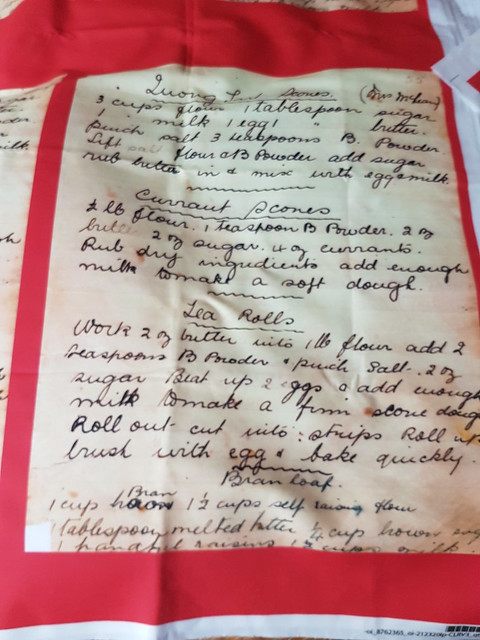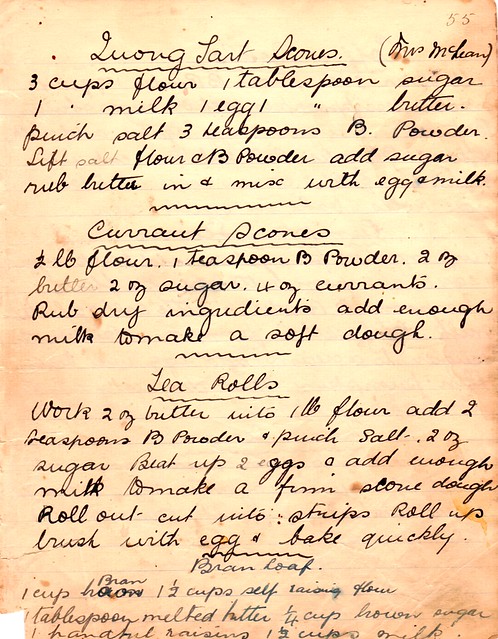Tuesday, February 21, 2017
local studies and knitting
Thursday, February 16, 2017
print on demand fabric - local studies potential
I recently had my first play with Spoonflower. The image below shows what the print looks like. I was impressed. I hemmed these and they became small table cloths (for gifts).

There is a lot of potential for local studies digitised material to be turned into fabric, and Spoonflower is just one option. I am a fan of Redbubble too, for the objects which can be created, but this time I wanted the flexibility of fabric, not an end product.
The print is from hand written recipes which one of my grandmothers recorded, and, as you can see from the scan below, became a bit battered over time. I like that they were used. I have not made all the recipes on this page, but the Quong Tart Scones and the Current Scones are both lovely (even if I did have to look up weight conversions).

You can see more of these hand written recipes on Flickr. If anyone wants to help transcribe them, that would be brilliant. I am doing them slowly as part of a family project.
I have not seen local studies collections encouraging the use of their collections for print on demand fabric, but was impressed to see State Library of Victoria encouraging using designs from their collection for paper.

There is a lot of potential for local studies digitised material to be turned into fabric, and Spoonflower is just one option. I am a fan of Redbubble too, for the objects which can be created, but this time I wanted the flexibility of fabric, not an end product.
The print is from hand written recipes which one of my grandmothers recorded, and, as you can see from the scan below, became a bit battered over time. I like that they were used. I have not made all the recipes on this page, but the Quong Tart Scones and the Current Scones are both lovely (even if I did have to look up weight conversions).

You can see more of these hand written recipes on Flickr. If anyone wants to help transcribe them, that would be brilliant. I am doing them slowly as part of a family project.
I have not seen local studies collections encouraging the use of their collections for print on demand fabric, but was impressed to see State Library of Victoria encouraging using designs from their collection for paper.
Tuesday, February 14, 2017
Boston Public Library profiling love of reading
I thought a while before I wrote that title, but, while obvious, it fits this series on Instagram
I also like that this is a way to show that libraries have a range of jobs too. Great work by Boston Public Library.
This is the first in what promises to be a series of photographs showing children of Boston Public Library staff, and what they like reading. This is a lovely photograph.A photo posted by Boston Public Library (@bplboston) on
I also like that this is a way to show that libraries have a range of jobs too. Great work by Boston Public Library.
Monday, February 13, 2017
some thoughts on @Knitsonik stranded colourwork sourcebook
 Knitsonik Stranded Colourwork Sourcebook by Felicity Ford
Knitsonik Stranded Colourwork Sourcebook by Felicity FordMy rating: 5 of 5 stars
This is a wonderful and inspiring book about knitting. It is also a great book for local studies. Felicity Ford takes inspiration from daily object including brickwork, beer, fruit cake and walnut trees and turns them into stranded colourwork. Ford takes the reader through her process, and shows the various stages, including the colour combinations which she regards as not as successful. All the examples are kept as a record, and they are interesting in their own right. I look forward to exploring this work in more detail as I would like to see what I could come up with. I also want to try the fruit cake recipe which is included in this book.
How I think this book could work for local studies, is that local knitters could have workshops exploring the built and natural environment and knit their responses to this. Ford uses examples from Reading (where she lives), and from her drive to work, so some of the examples in this book are also recording material of interest for local studies collections.
View all my reviews
Subscribe to:
Comments (Atom)